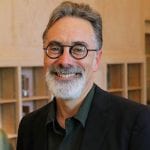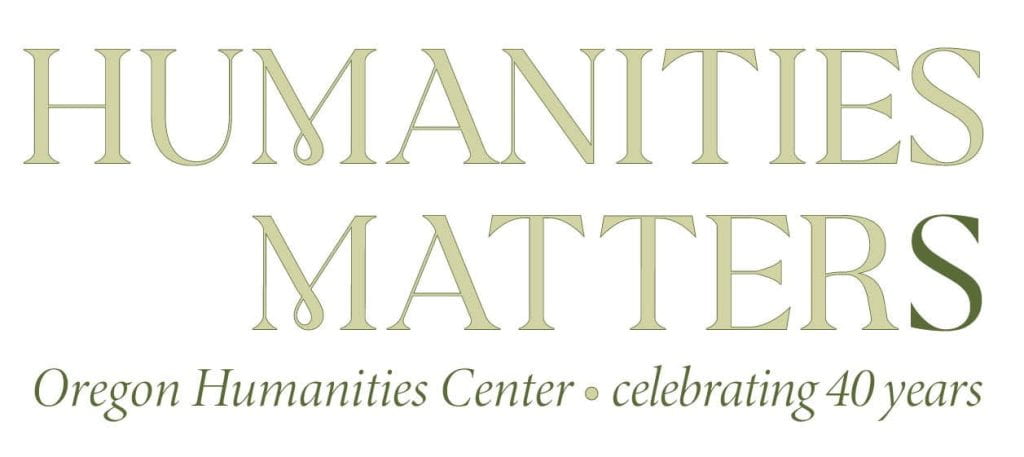2023 OHC Director’s Report by Paul Peppis
This year marks a momentous milestone for the Oregon Humanities Center (OHC). Forty years ago, in 1983, the University of Oregon (UO) first established the OHC with the help of a grant from the

National Endowment for the Humanities (NEH). Four years later, in 1987, with the help of a second NEH Challenge Grant and the support of a major capital campaign that prioritized the OHC as one of the UO’s highest priorities, the Center was expanded to fulfill its current three-part mission: 1) supporting and disseminating faculty, graduate, and undergraduate humanities research to create new knowledge and advance interdisciplinary scholarship; 2) fostering the development of innovative humanities courses to enhance and enlarge educational opportunities available to UO’s students; and 3) offering timely public programming in the humanities to enrich the knowledge and lives of Oregon’s citizens. These crucial aspects of the OHC’s mission are interrelated and integral to its role as a leading UO research center, the only one of UO’s myriad research centers devoted entirely to supporting research, teaching, and programming in the humanities.
As a fitting theme for the lectures, events, and activities we’ll sponsor and co-sponsor during our 40th year, we’ve selected “Humanities Matter(s).” We mean that theme in two key senses. First, we want to highlight and celebrate the wide and varied range of matter that UO scholars and students who work in the humanities and the humanistic social sciences and professional fields study and research. Second, we want to highlight and celebrate the ongoing and urgent value of the humanities in all their richness and variety. At a moment of continuing social and political uncertainty, upheaval, and controversy, a moment when divides of every kind have riven our society into a series of antagonistic and intolerant camps, a moment when pundits and politicians alternately bemoan and applaud the “crisis,” “decline,” or even “death” of the humanities, we at the OHC believe, more determinedly than ever, that the humanities—at UO and beyond—remain strong, vibrant, and relevant. Indeed, we believe that the diverse matter humanists study, the knowledges and skills we teach, and the values we defend—cultural literacy, critical thinking, clear and persuasive communication, tolerance and open-mindedness—are today more relevant than ever.
To open our 40th anniversary celebrations, we’re hosting a keynote panel featuring all the OHC’s directors, past and present: John Stuhr, Emory University Professor of Philosophy and the OHC’s first director (1987–1994); Steven Shankman, UO Professor of English (emerit), UNESCO Chair in Transcultural Studies, Interreligious Dialogue, and Peace, and the OHC’s second director (1994–2008); Barbara Altmann, President, Franklin & Marshall College, and the OHC’s third director (2008–2013); and myself, Paul Peppis, UO Professor of English, and the OHC’s fourth and current director. Scheduled for Friday, November 3rd, this keynote panel invites the OHC’s distinguished panelists to reflect on the OHC’s history, especially the key accomplishments of their respective terms as director, and to share their thoughts and advice about the future of the humanities at UO, in the academy, and beyond. I hope you will be able to join us!
We will follow that exciting keynote panel with a series of talks, panels, and events across the academic year featuring UO humanities scholars who will discuss the various matter they study and why what they study and the knowledge they produce matters. Another key event in our 40th anniversary consideration of “Humanities Matter(s)” is this year’s Cressman Lecture, scheduled for March 7th, featuring UC Santa Barbara Professor of English (emerit) Christopher Newfield, today’s leading scholar of “Critical University Studies,” who will share some of his cogent insights into the current state of the American academy and the academic humanities and about how we can work to keep the humanities strong and vibrant despite declining academic and political respect for and investment in the humanistic disciplines.
and the knowledge they produce matters. Another key event in our 40th anniversary consideration of “Humanities Matter(s)” is this year’s Cressman Lecture, scheduled for March 7th, featuring UC Santa Barbara Professor of English (emerit) Christopher Newfield, today’s leading scholar of “Critical University Studies,” who will share some of his cogent insights into the current state of the American academy and the academic humanities and about how we can work to keep the humanities strong and vibrant despite declining academic and political respect for and investment in the humanistic disciplines.
The following pages and our calendar of events provide details about our 40th anniversary kickoff panel and the other exciting arts and humanities talks, events, and exhibits occurring this term, many sponsored or co-sponsored by the OHC, as well as our research fellows’ Work-in-Progress talks. As you’ll see, the offerings provide strong evidence that the humanities still matter.
To recognize our 40th anniversary and to help propel the OHC into its next chapter, we are also hosting a special DuckFunder campaign during the month of November. We hope to raise at least $40,000 in gifts to strengthen and expand our research and teaching fellowship programs, especially those that support undergraduate and graduate students. Please help us reach—and perhaps exceed—that goal! Your gifts help ensure that the OHC will continue to thrive for another 40 years!
As I come to the end of this year’s Director’s column, I need to share my gratitude and admiration to all those who helped the OHC carry out its critical mission to promote and strengthen the humanities and humanities research over the last 40 years: our amazing staff, Faculty Advisory Board, external Board of Visitors, and all those countless devotees of the humanities who support and advocate for the humanities. Your generous faith and support keep us going every day as they have for 40 years!
I want to close on a more personal note: this year marks not only the OHC’s 40th anniversary. It also marks the final year of my term as OHC director. For the past decade, I have had the incomparable privilege and pleasure of helping to guide this incredible institution. I have worked hard to advance the OHC’s crucial mission and to support vibrant humanities scholarship, programming, and teaching in every way I could. Serving at the OHC has been the high point of my career as an administrator, scholar, and educator. And I am endlessly grateful to everyone I’ve had the opportunity to work with and learn from over the past ten years for the kind friendship, generous support, and incomparable lessons you have shared with me.